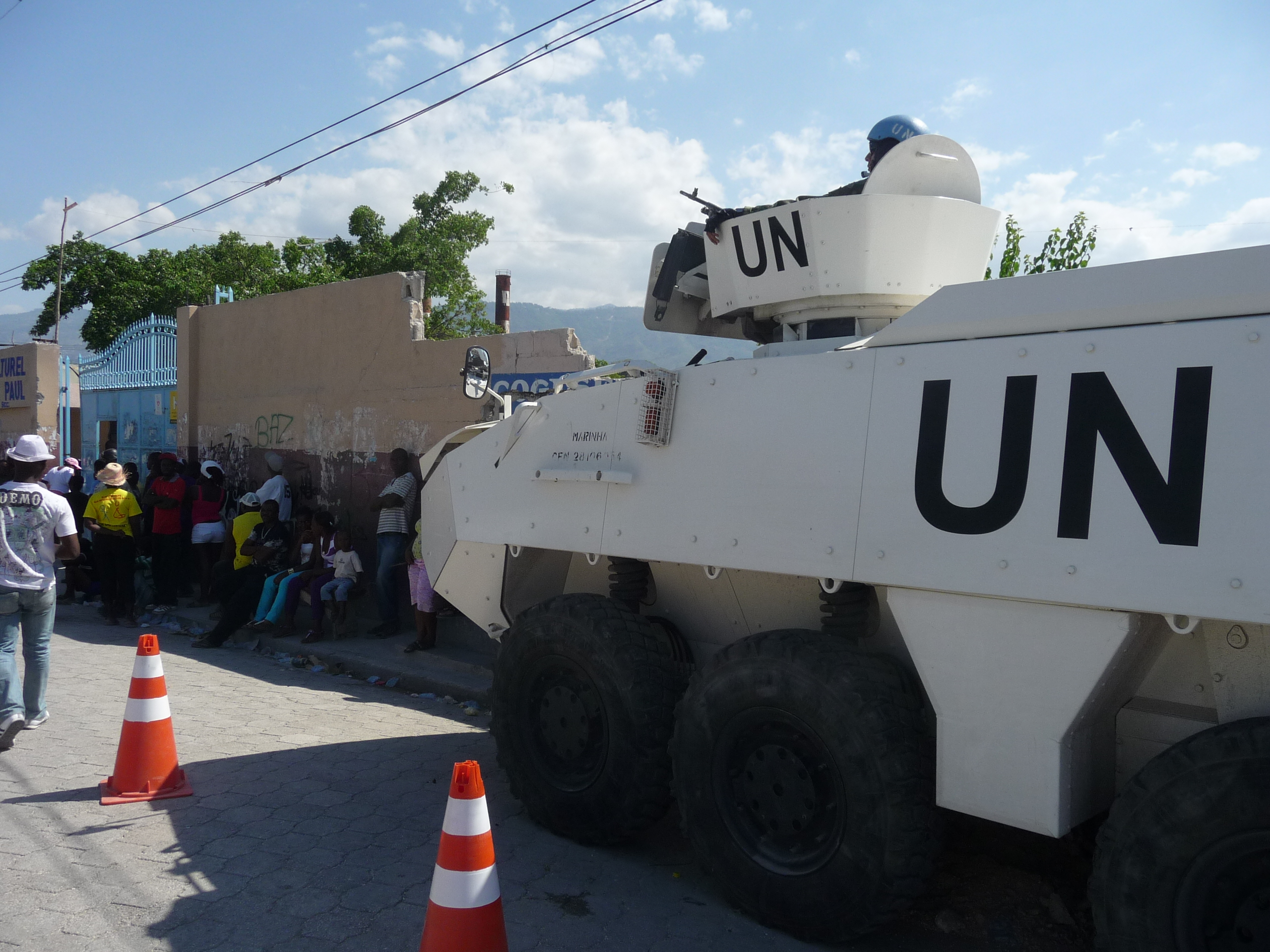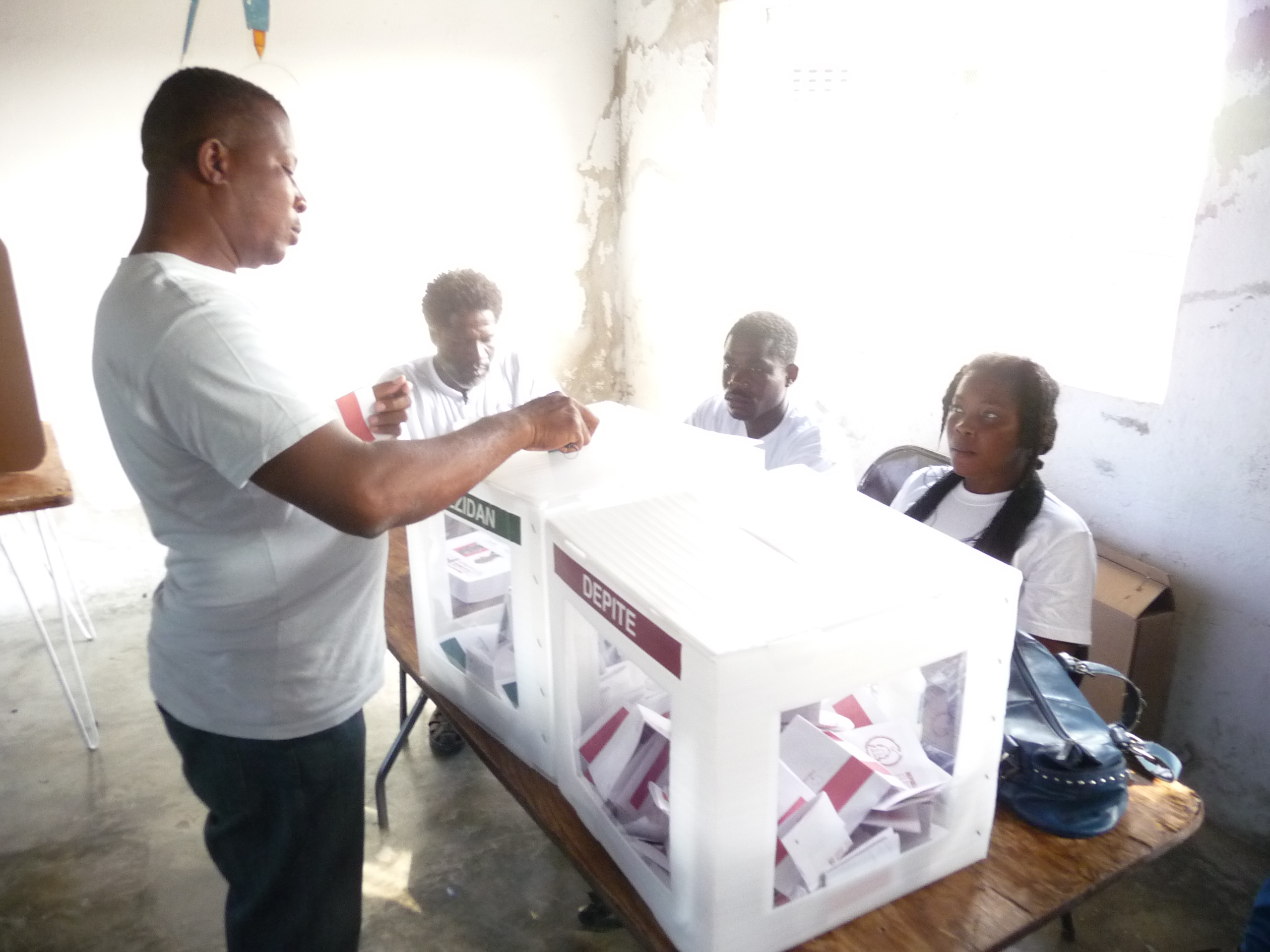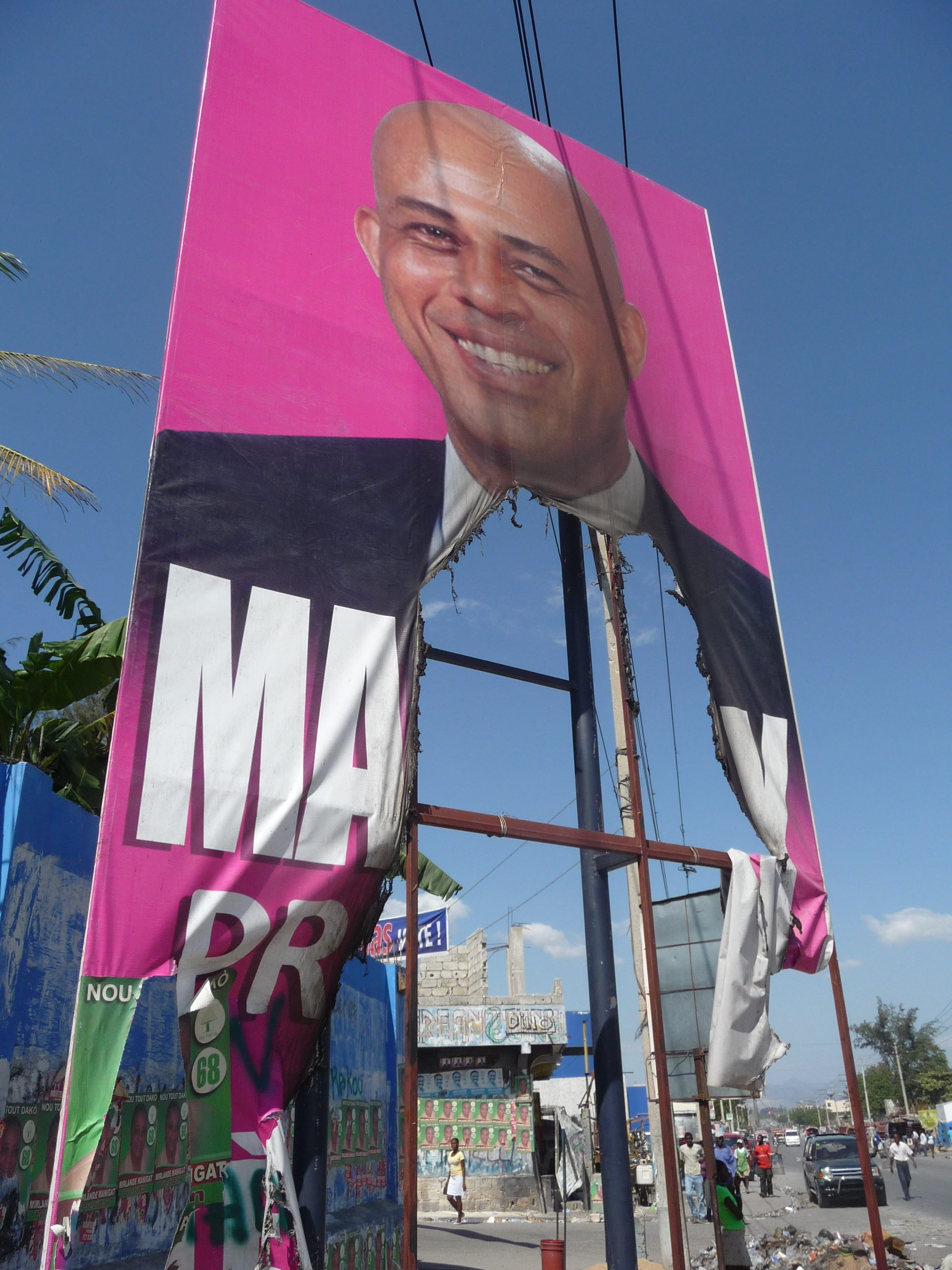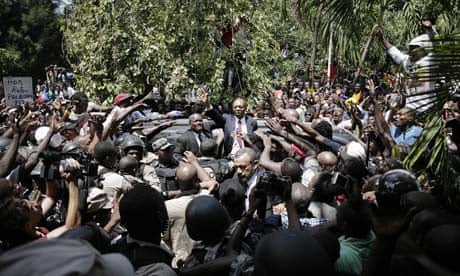You are using an out of date browser. It may not display this or other websites correctly.
You should upgrade or use an alternative browser.
You should upgrade or use an alternative browser.
Haiti: Nearly a Million People Took to the Streets.They Want the Western-imposed government out of
- Thread starter loyola llothta
- Start date
More options
Who Replied?loyola llothta
☭☭☭
As Martelly Mimics Aristide, Haitians Boycott Second Round Contest Between Neo-Duvalierists
March 23, 2011

UN occupation troops and tanks guarded many voting centers, like this one in Cité Soleil. Turn-out for the “selection” was light. Credit: Kim Ives/Haïti Liberté
https://haitiliberte.com/as-martell...econd-round-contest-between-neo-duvalierists/
An earlier version of this article entitled “Michel Martelly, Aristide’s weak imitator” was published by The Guardian (UK) on Mar. 22, 2011
March 23, 2011

UN occupation troops and tanks guarded many voting centers, like this one in Cité Soleil. Turn-out for the “selection” was light. Credit: Kim Ives/Haïti Liberté
Former President Jean-Bertrand Aristide was the real winner of Haiti’s Mar. 20 presidential and deputy runoffs as the majority of Haiti’s 4.7 million voters shunned choosing between a vulgar pro-coup konpa musician, Michel “Sweet Micky” Martelly, and a professorial former First Lady, Mirlande Manigat, for president. Both candidates share right-wing histories (supporting the 1991 and 2004 coups d’état against Aristide) and programmes (most tellingly, reactivation of the Haitian army, which Aristide demobilized in 1995).
Most polling stations had only light turn-out. Any voting lines observed around the capital, Port-au-Prince, and its tent-strewn suburbs were due to administrative delays and irregularities (which were widespread), including a lack of ballots, finger-marking ink or poll workers. One station had ballots for a 2009 senate race delivered. Some polls opened up to four hours late.
Our random sampling of final vote tallies at four polling stations (each composed of several “voting bureaus”) in Cité Soleil, Delmas and Lalue revealed that only 17.7% of their registered voters turned out to vote. That participation rate is well below the almost 23% rate of the dramatically flawed Nov. 28 first round, which already marked a record low for Haiti, and all Latin America, since such record-keeping began over 60 years ago.
An OAS poll observer said that turnout in Arcahaie and Cabaret, two rural towns north of the capital, was only about 25%. The random samples showed Martelly leading Manigat by about three to one. The elections took place despite the fact that the Provisional Electoral Council (CEP) never voted to authorize a second round. This illegality was “one of our concerns,” OAS/Caricom observer team chief Colin Granderson told Haïti Liberté and Democracy Now! the evening before the election. That “concern” about the law didn’t stop the election though.
In a Mar. 21 press conference, Granderson acknowledged the low turnout, admitting that the “final numbers were a bit disappointing.” The CEP will not announce preliminary results until Mar. 31; final tallies are due Apr. 16.

Most polling stations had only light turn-out. Any voting lines observed around the capital and its suburbs were due to administrative delays and irregularities, which were widespread. Credit: Kim Ives/Haiti Liberté
Aristide landed in Haiti from a seven-year exile in South Africa aboard a small government jet from that country at 9:10 am on Mar. 18. He was met first by scores of elbowing journalists on the tarmac, and then greeted on his two-mile drive home to Tabarre by tens of thousands of Haitians, who descended on the airport as the news of his arrival – preceded by many false alarms – spread like wildfire through the capital region.
In his arrival speech, Aristide did not directly criticize the illegal elections, as the US and French governments (which had spearheaded the 2004 coup against him) had feared, causing them to work hard at blocking his return. (Despite crises in Japan and the Middle East, President Barack Obama found the time to make two phone calls to his South African counterpart Jacob Zuma in an unsuccessful effort to have the flight that carried Aristide cancelled.) Instead, Aristide simply observed that “the problem is exclusion, the solution is inclusion.” The CEP had arbitrarily barred Aristide’s Fanmi Lavalas party from the election in November 2009, two months before the Jan. 12 earthquake.
“The exclusion of the Lavalas Family is exclusion of the majority,” Aristide continued in Kreyòl. “Exclusion of the majority is exactly like cutting off the branch that we are all sitting on.”
The Haitian people got the message loud and clear, although many of the young people who flooded into the Aristides’ courtyard, scaling the compound’s walls and climbing onto the only partially repaired house’s roof proclaimed that they would vote “tèt kale,” a reference to Martelly’s bald head. However, others in the giant crowd often interrupted them, saying “there was no first round, so there can be no second round,” a slogan devised by boycotting Lavalas base organizations and embraced by 10 of the 17 other jilted presidential candidates.

Martelly seduced parts of Aristide’s urban poor base with intermittent populist and nationalist posturing, an irreverent stage persona, and a well-financed, professionally-run campaign. Credit: Kim Ives/Haiti Liberté
“Very few are participating in this selection today,” said Wilson St Val, a former member of Aristide’s presidential security unit, standing in front of a Cité Soleil voting station guarded by UN occupation troops and tanks on election day. (Boycotting Haitians prefer “selection” to “election.”)
“There is minimal participation in all the popular neighborhoods because they are Lavalas bastions,” he said. “The foreigners thought Aristide would disrupt the mascarade, but he didn’t. He and we are letting them do their thing, but we are still here, watching.”
Martelly has seduced parts of Aristide’s urban poor base with intermittent populist and nationalist posturing, an irreverent stage persona and a well-financed, professionally-run campaign, which climaxed with a star-studded concert (including Wyclef Jean and Prad of the Fugees) on the Champ de Mars, complete with confetti, smoke machines, fire-works and a bone-vibrating sound system. If that is not enough, Martelly has also borrowed a trick from François “Papa Doc” Duvalier, the cagey dictator who won a 1957 election and then rigged a 1964 referendum to make himself “President for Life” until his death in 1971. To consolidate his ruthless power, Duvalier formed the Volunteers for National Security (VSN), more commonly known as the Tonton Macoutes. Every Macoute received a card that afforded him many privileges, like free merchandise from any store he entered, entitlement to coerced sex, and fear and respect from people in general.
This system, which hoisted many a poor devil from low station to high, may have inspired a 21st-century variant. For $30, before the election, potential voters could join the Base Michel Joseph Martelly (BMJM)) and invest in a pink plastic membership card, with photo, which promises many advantages (such as a job, say) when the Martelly administration comes to power. The move ensures prepaid voter participation and an esprit de corps among the loyal.
“I’m proud to carry this card and to vote for tèt kale,” said Dimitry Bellefleur, a “Classe 2” member who was attending a pro-Martelly committee meeting in Barbancourt II, an earthquake victim tent camp of 310 families pitched on a dusty strip of industrial wasteland wedged between an assembly factory and an NGO depot near the airport. These BMJM committees are boring into poor neighborhoods and eviction-threatened IDP camps around Haiti.
“Martelly has come with a populist message,” St Val said. “Everybody can see that he is saying practically the same things you would hear coming from Aristide’s mouth. Some organizations from the popular neighborhoods are marching with him, but not many.”

Former president Jean-Bertrand Aristide greets followers at his home in Port-au-Prince on Mar. 18, 2011. Credit: André S Mart Nez Casares/EPA
Martelly’s successful populist pitch has been dented by yet another YouTube video, where he talks about Haiti’s militant poor: “The Lavalas are so ugly. They smell like shyt. fukk you, Lavalas. fukk you, Jean-Bertrand Aristide.”
When Martelly came to vote in Pétionville on election day, it briefly looked like a replay of 1990, when Aristide was first elected president. An ecstatic crowd massed on the sidewalks and hailed the candidate, chanting the same songs their parents did 20 years ago, just replacing “Titid” with “Micky.”
But just beyond the crowd on which all cameras were trained, hundreds of people walked like ghosts among the tents still pitched on the Place St. Pierre, completely uninterested in the commotion 25 yards away. 1990 this definitely was not. Aristide summed it up when giving Amy Goodman and Sharif Abdel Kouddous of Democracy Now! an interview in his home just hours after his return. He spoke of the similarities between 1990 and the outpouring for his return and of “sharing love with the people, loving them.”
But, he continued, “they are so bright, if you are faking, pretending that you love them and using beautiful words, they will smell it, they will get it.”
https://haitiliberte.com/as-martell...econd-round-contest-between-neo-duvalierists/
An earlier version of this article entitled “Michel Martelly, Aristide’s weak imitator” was published by The Guardian (UK) on Mar. 22, 2011
loyola llothta
☭☭☭
I dont see anything. What was it
Tweet got deleted.I dont see anything. What was it
loyola llothta
☭☭☭
short summary is in the OP but here it is:@loyola llothta @Jesus is my protector can someone explain to me how this corruption has even started or allowed to have proliferated? Like, there's NOTHING in place in Haiti to stop blatant corruption? Like how does these guys get in power? It seems like the ones making decisions are the ones in power whom won't check themselves.
First Stage-Mainstream media
Just like with Venezuela now, the international community start publishing and circling propaganda in the media about Haiti in early 2000's. Euro and South Ameican countries who never talked about Haiti start pushing Aristide need to go. They was saying he was running 500-200 million drug empire ...Dictator ..gun runner.. killing his people.. funding gangs/bandits etc
2nd Stage
Under the Bush administration the US and the Core Group(UN, EU, OAS, France, Canada, Spain, Germany, Brazil) planned to take over Haiti permanently in 2004 with the rebels-Liyba ish strategy. At the time in the DR, the US officers were training"rebels" aka former haitian military and death squad leaders from the 90s to oust Aristide and his party. The first attempt failed in North Haiti but the "rebels" who werent killed or capture were able to regroup back to the DR, to do again successfully . The haitian government told the DR government to send the rebels back to Haiti but they refused because they have no extradition laws with Haiti..... After the rebels successfully took over Haiti with the US forces help (in PAP), the international community launch the US proxy U.N occupation, the UN start killing and raping the people to suppress them while slowly reintegrate the "rebels" to power in the police/military force. Eventually all the criminals(drug traffickers to paramilitary) from the past in the poppa/baby doc era were reshuffle in the Sweet Mickey's Tet kale party and other political party
The UN and international community(with the foreign NGO's and USAID) is keeping the criminals, drug traffickers, murders in power to sell the country out of natural resources, people, keep them slaving and land. Haiti is apartheid state
2004 UN Occupation thread:
https://www.thecoli.com/threads/15-years-of-uss-proxy-occupation-of-haiti-us-sponsored-coup-d’etat-the-destabilization-of-haiti.699370/
Watch the Documentary for the turning point:
Haiti: We Must Kill The Bandits
Read the book to get the details and deep history :
Paramilitarism and the Assault on Democracy in Haiti
Read the articles and listen to the audio link in this thread for details or more overlook information.
loyola llothta
☭☭☭
This clown Moise gotta step down.

Secure Da Bag
Veteran
This clown Moise gotta step down.
I can't front. That's dumb. Why not just take the damn fuel for free? Why burn it down? You're gonna need that fuel later. And they know that.
There was probably no fuel or they already took the fuel and then burned it down.I can't front. That's dumb. Why not just take the damn fuel for free? Why burn it down? You're gonna need that fuel later. And they know that.
loyola llothta
☭☭☭
WARNING GRAPHIC IMAGE: A journalist killed & two protesters wounded in Kafou Tifou neighborhood of #Haiti's capital. Pierre-Richard RIGUEUR, w/Haiti News killed when unidentified gunmen opened fire from a red Toyota .#wi_news_86
loyola llothta
☭☭☭
Trump-backed corrupt #PHTK regime digs knife deeper into #Venezuela by voting to invoke antiquated Rio Treaty by equally corrupt @OAS_official. https://www.haitilibre.com/article-287
loyola llothta
☭☭☭
Saw this awhile back in Aug. @For Da Bag @Jesus is my protector
Scary.
loyola llothta
☭☭☭
The corrupt #PHTK ruling party has resurrected #Haiti's dreaded parasitic military. This documentary is a MUST SEE to understand why this is a major setback for democracy & human Rights in #Haiti. https://youtu.be/wJXCc7q701g

